Holding Their Fire
Tarantino's charmingly chatty thriller; Scorsese's pleasantly boring biopic.
Jackie Brown
Directed by Quentin Tarantino
Miramax Films
Kundun
Directed by Martin Scorsese
Touchstone Pictures
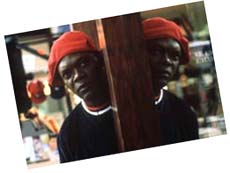
For the last month, I--along with, I suspect, the rest of the press--have been limbering up for some serious Quentin Tarantino bashing. I began by reading Jane Hamsher's Killer Instinct, which paints a disturbing portrait of the nerdy Wunderkind as a devious back-stabber and egomaniac, not to mention a plagiarist and a credit thief. I re-watched that abominable mess From Dusk Till Dawn (1996), with its bottom-drawer Tarantino script and smug Tarantino performance. I thought back on Reservoir Dogs (1992) and True Romance (1993) and saw them for what they are: the sadistic fantasies of an eternal video clerk. I scrutinized photos of Tarantino and Mira Sorvino and decided that he didn't deserve a woman so completely adorable. Then I went to see Jackie Brown, which I'd heard from other people was a terrible bore. And I kind of ... sort of ... liked it.
The movie begins with Pam Grier--in profile, so that she looks like an ancient Egyptian princess in a modern, blue flight-attendant's uniform--gliding on an airport people mover while the theme from Across 110th Street blasts on the soundtrack. Only Tarantino would have the audacity to steal the title song from one of the better Harlem blaxploitation pictures for a film that isn't even set in New York. Then, in a scene so attenuated that it would make the directors of interminable French art movies like Jeanne Dielman and Celine and Julie Go Boating look at their watches and exhale noisily, a long-haired Samuel L. Jackson gives a running commentary on gun culture for grizzled, sad-sack ex-con Robert De Niro, while beach-girl moll Bridget Fonda smokes dope and crosses and recrosses her long, tanned legs. Jackson rat-tat-tats along ("Now your .45's got a serious fucking jamming problem, but the niggers all want it 'cause they seen it on New York Undercover"), while De Niro presses his lips together and cocks his head, and Fonda yawns and complains about having to get up to answer the constantly ringing phone. Tarantino isn't in a hurry to get to the plot, and when he gets to the plot you understand why.
Jackie Brown is your run-of-the-mill Elmore Leonard yarn (from the novel Rum Punch), low on action and high on double crosses and double double crosses and marginal crime figures sweatily plotting to blow away former associates before they can be blown away by them. Tarantino should never shackle himself to a novel. The beauty of his great Pulp Fiction (1994) is that it seems to be writing itself as it goes along, spun out by a fantasist who has seen too many thrillers, who's delirious with his own cleverness, and prepared to do anything to jolt you out of your genre-induced stupor. Think back on that film and its exhilaratingly jumbled syntax; its shifting points of view; and its protagonist (John Travolta), who's shockingly slain and who then shows up for an encore in a different story line. Tarantino keeps kick-starting the narrative before it ever has a chance to stall. At one point in Jackie Brown, Tarantino repeats the same sequence from three different perspectives and the film comes roaring to life--not because there's any organic reason for the sequence to be repeated, but because by withholding details in one go-round and then providing them in the next, he generates the teasing suspense you find in the best (and most shameless) pulp fiction.
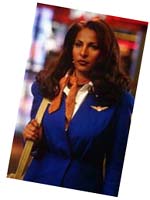
What is Jackie Brown about? Jackson is Ordell Robbie, a lethal-weapons dealer who bails out his arrested employees and then makes sure they don't go to prison--not by hiring smart attorneys or spiriting them out of the country, but by killing them. Grier is down-on-her-luck Jackie, a flight attendant for a third-class airline who also works as a courier for Robbie. When she's arrested by a zealous Bureau of Alcohol, Tobacco, and Firearms agent (Michael Keaton), she faces the prospect of going to prison, becoming Jackson's next victim, or both. For reasons that would take too long to explain (and do!), she hatches a plot with a quietly smitten bail bondsman (Robert Forster) to finish off her murderous boss, satisfy the feds, and keep the loot for herself.
A s the bored synopsis suggests, this is ho-hum, straight-to-video material. And yet, even at its most crawlingly linear, Jackie Brown is diverting. If nothing else, I was diverted by the director's gall at stretching out those vacuous scenes. Tarantino has a couch-potato aesthetic: He makes movies in which you can wallow, stoned, repeating the good lines to your friends, savoring exchanges like the one in which Jackson tells Fonda and De Niro that dope will rob them of their ambition and Fonda replies, "Not if your ambition is to get high and watch TV." This is a universe of glassy-eyed paranoiacs, where the people who pull the trigger do so peevishly, in a state of high dudgeon. And this time Tarantino keeps the splatter either off-screen or at a distance, so that it's only emotionally garish.
The film is more Jarmusch than Peckinpah--its soul is in the minutiae. When Jackson talks business with Forster's bail bondsman, henchman De Niro asks if he can be excused to go sit in the car, not for any reason relating to the narrative, but so Tarantino can write Jackson a monologue about not touching the meticulously set sound levels on his car stereo. I have black friends who found Jackson's character a racist outrage, and far be it from me to contradict them, but his homicidal, Mamety single-mindedness made me laugh a lot.
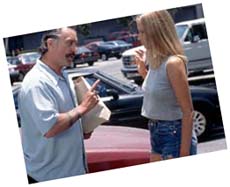
Actors relish this stuff, which is why Tarantino attracts such high-wattage stars for such low wages. Keaton reportedly begged to be cast, although his role is strictly subsidiary; he gives a wound-up and ingratiating performance. Fonda has the kind of slutty vivacity she had at the outset of her career. She lightens the film the way egg whites lighten a batter--she gives it some spring. De Niro mostly mugs, but if his miraculous ability to disappear into his parts is long gone, he has learned to make his not disappearing into his parts the source of high comedy. Grier is considerably lower-key than in her blaxploitation era. Tarantino has built her a pedestal, and she has the charming good sense to look slightly embarrassed when she occupies it. My favorite is Forster as Max Cherry--a quiet, stolid, middle-class businessman who goes sweet on a black woman and buys a soul tape for his car, but who can't quite manage to break through his whiteness. He's like some helpless Chekhov character who's hopelessly inarticulate about his feelings, which makes him a blessed oasis in a Tarantino picture.
Before Oliver Stone left him wheezing in the dust, Martin Scorsese was our speed-freakiest director, whose virtuoso attacks sometimes overwhelmed their subjects. A critic I respect referred admiringly to The Age of Innocence (1993) as "virile," and I thought: Exactly! That's the problem! Scorsese clearly didn't want to be perceived as having made a "women's picture," so he brought to it all kinds of manic energy that had nothing to do with what it was about.
In Kundun, his hagiography of the 14th and current Dalai Lama, he finds the proper tempo. I can imagine the director--a jabberer and alleged tantrum-thrower--beginning every day in Tibet with a spell of meditation, slowing down his rhythms, clearing his mind, focusing on the one shot or scene of the day. The movie isn't self-effacing--it's showy and self-consciously pictorial in its reverence. But it does signal the director's courageous attempt to transcend his distinctive cinematic voice, and I respect him for his labors.
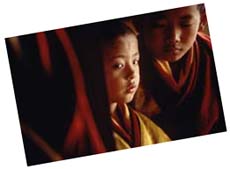
T he movie begins with the death of the 13th Dalai Lama and the search for his holy reincarnated self among the children of Tibet. We know that the boy whom the searchers find is the right one because we've previously seen him separate two really nasty warring insects. At his age, I was cutting caterpillars in half with a WeedWacker. I guess that's why he's the Dalai Lama and I'm a critic.
As in The Last Temptation of Christ (1988), Scorsese evinces a profound faith in magic and miracles. He takes the Dalai Lama at his Word. Apart from the fact that his actors speak in pidgin English, he almost had me convinced. Any leader who could go up against the smarmy Mao (here portrayed--hilariously--as an imperious James Bond-style villain) gets my vote. The second half of the movie details the Dalai Lama's subjects' efforts to convince him to flee to India and his refusal to go until the oracle says it's OK--at the same moment, coincidentally, that the Communist Chinese begin the out-and-out slaughter of the Tibetan resistance. No fool, that oracle.
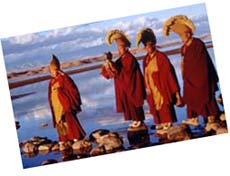
In most Philip Glass movie scores, the strings go da-da da-da da-da da-da da-da da-da da-da da-da da-da da-da, but in this one Glass adds deep gongs and low horns, so it goes da-da da-da da-da da-da da-da BWONNGG da-da da-da da-da da-da da-da BWONNGG. The music ties together all the pretty pictures, gives the narrative some momentum, and helps to induce a kind of alert detachment, so that you're neither especially interested nor especially bored. Perhaps that's a state of Buddhist enlightenment.